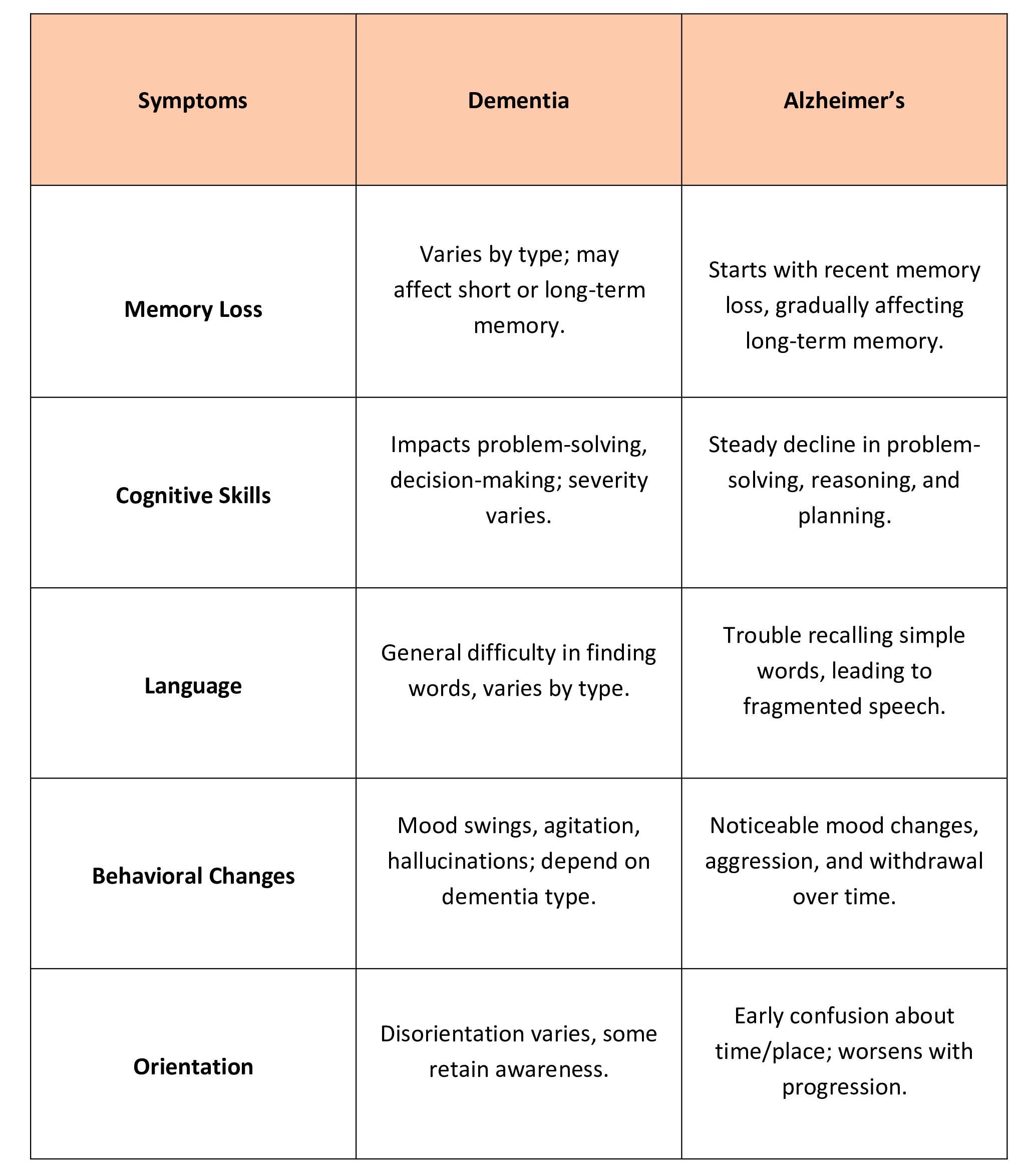Understanding how to provide the right care can make all the difference in improving their quality of life. In this article, you can find tips and tricks that will help you take daily care of your elderly loved one.
Table of Contents
ToggleWhat are the Three Stages of Alzheimr’s?
Alzheimer’s and dementia progress through 7 main stages, but three main stages are;
- Early Stage: Mild symptoms such as memory lapses and difficulty with tasks. Care may focus on providing reminders and establishing routines.
- Middle Stage: Memory loss worsens, and behavioral changes become more pronounced. Caregivers need to provide more hands-on assistance with daily activities like dressing and bathing.
- Late Stage: Severe cognitive decline occurs, including loss of physical abilities. Care involves full-time support, including help with feeding, toileting, and mobility.
What is the Difference Between Alzheimer’s and Dementia Symptoms?
Dementia is an umbrella term that refers to the gradual loss of memory, communication abilities, and the ability to perform daily activities. Alzheimer’s is a type of dementia that affects the part of the brain responsible for learning, compromising memory, thinking, and reasoning skills.
Here we will provide a combined overview of what signs to look for;

Early recognition is essential for seeking timely medical advice and support.
How Can You Create a Safe Home Environment?
A safe environment is crucial for those living with Alzheimer’s or dementia, as they may have difficulty recognizing dangers in their surroundings. Here are some tips:
- Remove tripping hazards like rugs and clutter, and secure electrical cords. Install grab bars in bathrooms and anti-scald devices to prevent burns.
- Place toiletries in locked cabinets; items like toothpaste, shampoo, and soap may smell and look like food to Alzheimer patients.
- Place locks on cabinets containing potentially dangerous items, such as cleaning supplies and medications. Keep sharp objects like knives out of reach.
- Use door alarms or a bell on the door to prevent wandering. Use motion sensors; they light up when they sense motion. In case your loved one wakes up at night, they won’t have the risk of falling.
- Limit excess furniture and decorations to reduce confusion. Use contrasting colors for walls and floors to help with depth perception.
- Install locks either above or below eye level. There is a high chance that a person living with dementia might lock themselves in. To prevent this, remove locks from the inside or use coded locks or keypad locks for extra safety.
- Create a safe environment, not a place where they feel suffocated. Make sure to have some space for their activities.
Read More: Common Home Safety Hazards for Seniors and How to fix them
How to Manage Behavioral Changes in Elderly with Dementia?
Alzheimer’s and dementia can cause various behavioral changes, including anxiety, fear, aggression, agitation, hallucination, blaming others for minor things, difficulty sleeping, and mood swings. Here are strategies to manage these changes:
- Reacting calmly and maintaining a soothing tone can help de-escalate situations.
- Distract them with activities they enjoy, like listening to music or looking through a photo album.
- Structured daily routines can reduce confusion and anxiety. Make sure their eating, bathing, and dressing time is ame each day.
- Pay attention to situations that provoke negative behaviors, such as loud noises, and try to avoid them.
- Try to keep them physically active, which will keep their mind diverted and will improve their sleep.
- Offer comfort and reassurance. Sometimes, gentle touch or words can help soothe feelings of anger or frustration.
- Try to keep the home decorated with photographs and with the objects they love and feel comfortable around.
If this behavior worsens, contact your doctor; there may be a need to adjust the medication to help calm things down.

How Can You Communicate Effectively with Dementia & Alzheirmer’s Patients?
Effective communication can help strengthen the connection between you and your loved one:
- Give them time to express themselves and try not to interrupt.
- Speak slowly, using short sentences and simple words. Avoid complex questions that may confuse them.
- Make sure to face them directly to hold their attention. Try to be at eye level for them rather than standing over them.
- Speak calmly and avoid using a harsh tone around them. You might provoke feelings of fear in them.
- Allow them to complete their conversation, let’s not assume what they are going to say. Try to keep them involved in a conversation with another person, so they have a meaning purpose, and identity.
- Gestures, facial expressions, and touch can often convey meaning more effectively than words.
How to Build a Daily Routine to Reduce Anxiety?
A consistent daily routine can help reduce anxiety and confusion in individuals with dementia:
- Create a Schedule: Include regular times for meals, medications, exercise, and rest. Keep activities in the same order each day to establish predictability.
- Simplify Tasks: Break down complex activities into smaller, manageable steps. Provide clear instructions and gentle guidance.
- Incorporate Calming Activities: Add calming activities like listening to music, reading, or gentle physical exercise.
- Be Flexible: While routines are helpful, be adaptable to your loved one’s changing needs and moods.
How Do You Engage Dementia Patients in Activities?
Engaging activities can improve mood and cognitive function:
- Involve Them in Daily Tasks: Simple tasks like folding laundry or setting the table can give a sense of purpose. These repetitive tasks can evoke comforting memories
- Social Interaction: Arrange for visits from friends and family or involve them in community programs to keep them socially active.
- Art and Crafts: Painting, drawing, and crafting with different textures (e.g., clay) can be therapeutic, allowing for safe emotional expression and tactile stimulation.
- Collages: Patients can create collages using old family photos, magazine cutouts, or images related to their interests, fostering creativity and reminiscing.
- Simple DIY Projects: Activities like painting wooden boards, untying knots, or sorting objects can be adjusted to fit the patient’s abilities, providing both cognitive and physical stimulation.
- Music: Music has a profound effect on those with dementia. Playing familiar songs, introducing simple musical instruments, or singing can stimulate memories and create positive experiences.
Read More: Role of Music in Memory Care for Seniors with Dementia
Tips for Planning Activities:
When selecting activities, consider the patient’s current cognitive abilities, interests, and the progression of their condition. The activities should be simple, enjoyable, and familiar to reduce frustration and anxiety. In the early stages, more complex activities like reading, crossword puzzles, gardening, or cooking may be appropriate, while simpler sensory activities may be more suitable in later stages.

How Do You Plan for The Future?
Future planning is crucial for families dealing with dementia:
- Start Early: Plan as soon as possible to involve your loved one in decisions and ease future transitions
- Educate Yourself: Learn about dementia’s stages and involve family to prepare for upcoming challenges
- Assess Needs: Identify current and future care requirements, including home modifications, medication management, and safety
- Legal Planning: Establish power of attorney, wills, and healthcare directives while your parent can still make decisions.
- Financial Planning: Discuss financial matters, including budgeting for care services, insurance, and government benefits.
- Build a Flexible Care Plan: Create a care team with family and professionals. Plan for in-home support, adult day care, or memory care as needed
- Regular Review: Update plans as the disease progresses and keep documents accessible.
What Does Hospice Do for Alzheimer’s Patients?
Hospice care focuses on comfort and quality of life during the final stages of dementia:
- Pain and Symptom Management: Hospice professionals manage symptoms such as pain, breathing difficulties, and agitation.
- Emotional and Spiritual Support: Hospice provides emotional support for both the patient and family members, addressing spiritual concerns if desired.
- Respite for Caregivers: Hospice care can offer much-needed respite, providing caregivers with time to rest and focus on self-care.
To Learn More:
Looking for professional care? Reach out to us at wecare@considracare.com and we will be happy to assist you with the care needs of a loved one.
Final Thoughts:
Caring for a parent with Alzheimer’s or dementia is an evolving journey that requires compassion, patience, and planning. From creating a safe environment to understanding the progression of the disease, caregivers must adapt their strategies to meet their loved one’s changing needs.
FAQ
1. Is it okay to lock a dementia patient in their room?
No, locking a dementia patient in their room is not recommended. It can increase feelings of fear, anxiety, and confusion, potentially worsening their symptoms. Instead, use other safety measures like door alarms or barriers to prevent wandering while ensuring their comfort and safety.
2. How to calm an Alzheimer’s patient down?
To calm an Alzheimer’s patient, speak in a soothing tone, use simple language, and maintain eye contact. Redirect their attention to a calming activity, like listening to music or looking through a photo album. It’s also helpful to identify and address possible triggers, such as hunger, pain, or discomfort.
3. What are the basic considerations in caring for a client with Alzheimer’s disease?
When caring for someone with Alzheimer’s, ensure a safe environment, establish a consistent daily routine, and offer clear, simple communication. Patience, empathy, and understanding are key, as the person may experience memory loss, confusion, and behavioral changes.
4. What type of care is needed for Alzheimer’s patients?
Alzheimer’s patients need comprehensive care that includes help with daily activities, medication management, emotional support, and safety measures to prevent accidents or wandering. As the disease progresses, they may require more hands-on and specialized care, potentially involving professional caregivers or memory care programs.
5. What care is available for Alzheimer’s patients?
Care options for Alzheimer’s patients include in-home care, adult day programs, respite care, assisted living, memory care facilities, and hospice care for late-stage support. Support services, like counseling and support groups for caregivers, are also available to help manage the challenges of caregiving.

Fakiha is an experienced writer at ConsidraCare with an optimistic interest in life. She has a proactive approach to improving health and wellness for seniors. She offers well-researched and thoughtful information to help individuals make informed healthcare decisions for themselves and their loved ones.



